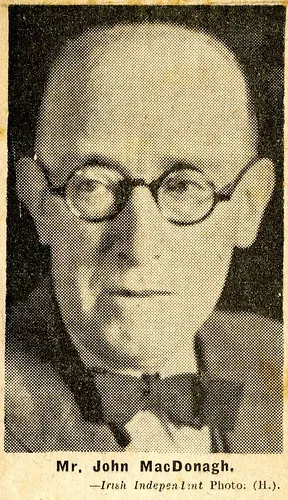John MacDonagh: The Forgotten Artist
Published on 5th April 2024
In early twentieth-century Ireland, John MacDonagh was one of the most influential figures in the Irish theatre and film spheres. An established playwright, composer, poet, and film director, MacDonagh’s work was highly acclaimed over his nearly fifty-year career. MacDonagh, the son of teachers, was born in Cloughjordan, Co. Tipperary in 1880. In his adult life, he travelled to Italy to train as an opera singer and performed throughout England and the United States with the Moody-Manners Opera Company. Upon his return to Ireland, he worked as an actor-producer for the Irish Theatre Company, co-founded by his older brother Thomas in 1914.
Theatre was not the only common interest John and Thomas shared. The two were also dedicated republicans, both having membership in the Irish Republican Brotherhood. They then served in the Irish Volunteers during the 1916 Easter Rising and were stationed in the Jacob’s Biscuit Factory on Bishop Street in Dublin. Thomas was later executed for his role in the Rising, and John was sentenced to life imprisonment, though he was released after only four months. He spent most of the duration of his prison sentence in Frongoch Prison in Wales.
In a letter he wrote during his time in Frongoch Prison (currently in DCLA’s Irish Theatre Archive), MacDonagh discusses the importance of literature. He explains that a list of books had been prepared for Art O’Brien (a fellow member of the Irish Republican Brotherhood) in London to provide to the Irish prisoners, of which MacDonagh says, ‘They included History of Ireland, Felon’s Track, & other publications so as to get men to read good books instead of useless (!) novelettes.’ These ‘good books’ MacDonagh listed discussed Irish revolutionary history, which was meaningful to him. Literature, in his view, should enrich the audience, rather than serve as a frivolous distraction.
MacDonagh’s high standards are evident throughout all kinds of his work. The Irish Jew, perhaps his most notable play, was wildly successful in Irish theatres during the 1920s and eventually went on to be produced in the United States. His revues (short pantomime-like theatrical skits), particularly ‘Dublin Tonight,’ were well-received across Ireland. A newspaper article praising a performance of his revue ‘Next Stop Dublin’ in the Olympia Theatre explains, ‘It is bright and smart, witty and sick, and full of local jokes for local people. The sort of jokes that will make you roar.’
In the 1930s, MacDonagh focused much of his attention on radio programming and advocating for the struggling Irish film industry. He became the Productions Manager for Radio Éireann in 1937 and introduced the programme ‘Question Time,’ a radio game show created to pose general knowledge trivia questions. It gained great popularity throughout Ireland and Great Britain. MacDonagh left this position in 1947 but continued to work in radio programming in the years following.
MacDonagh died in Meath Hospital on 1 July 1961, around age 81. Despite his immense popularity during his lifetime, MacDonagh’s accomplishments, both in the arts and in the fight for Irish independence, seem to be overshadowed and largely forgotten in the present day. However, his impact on Irish theatre and cinema, as well as on the country itself, is undoubtedly remarkable and deserves recognition.
Submitted by Ella Piroli
MPhil in Public History and Cultural Heritage in Trinity College Dublin
